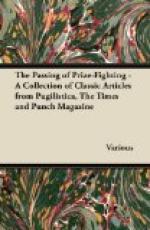At the court of Queen Anne this seems to have been an easy matter. St. Louis writes love-letters to several maids of honour and to a citizen’s wife, finishing the first act by invading the private apartments of the maiden ladies belonging to the court of the chaste Queen Anne.
The second act discovers him confined to his apartments by order of the Queen, having amused himself, while the intrigues begun by the love-letters are hatching, by running into debt, and being surrounded by duns. The intrigues are not long in coming to a head, for two ladies visit him separately in secret, and allow themselves to be hid in those never-failing adjuncts to a piece of dramatic intrigue—a couple of closets, which are used exactly in the same manner in “Foreign Affairs,” as in all the farces within the memory of man—ex. gr.:—The hero is alone; one lady enters cautiously. A tender interchange of sentiment ensues—a noise is heard, and the lady screams. “Ah! that closet!” Into which exit lady. Then enter lady No. 2. A second interchange of tender things—another noise behind. “No escape?” “None! and yet, happy thought, that closet.” Exit lady No. 2, into closet No. 2.
This is exactly as it happens in “Foreign Affairs.” The second noise is made by the husband of one of the concealed ladies, and the lover of the other. Here, out of the old “closet” materials, the dramatist has worked up one of the best situations—to use an actor’s word—we ever remember to have witnessed. It cannot be described; but it is really worth all the money to go and see it. Let our readers do so. The “Affairs” end by the boy fighting a couple of duels with the injured men; and thus, crowning the proof of his manhood, gets his wife to tolerate—to love him.
The piece was, as it deserved to be, highly successful; it was admirably acted by Mr. Webster as one of the injured lovers—Mr. Strickland and Mrs. Stirling, as a vulgar citizen and citizeness—by Miss P. Horton as Lady Bell—and even by a Mr. Clarke, who played a very small part—that of a barber—with great skill. Lastly, Madlle. Celeste, as the hero, acquitted herself to admiration. We suppose the farce is called “Foreign Affairs” out of compliment to this lady, who is the only “Foreign Affair” we could discover in the whole piece, if we except that it is translated from the French, which is, strictly, an affair of the author’s.




